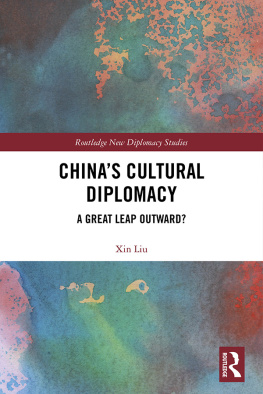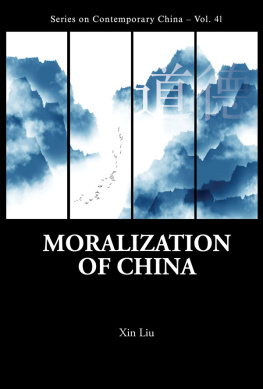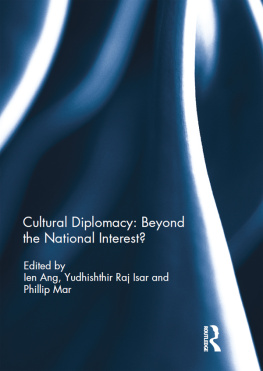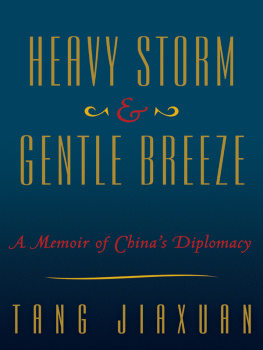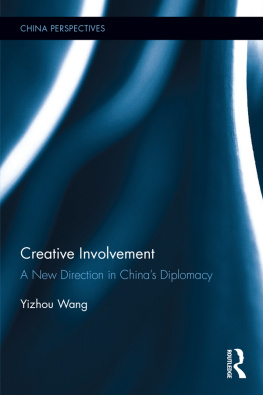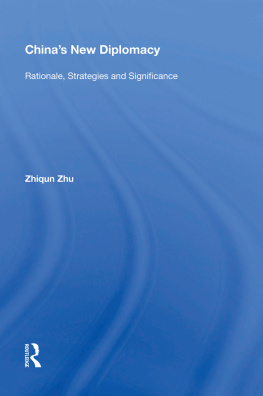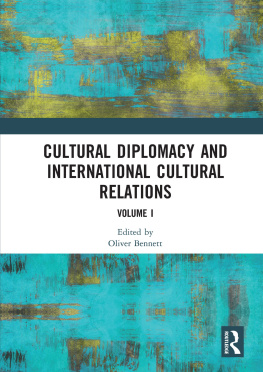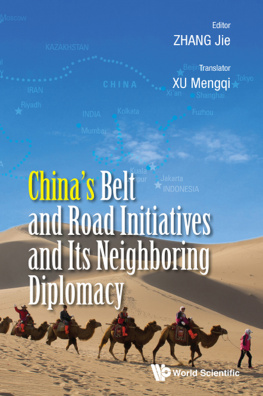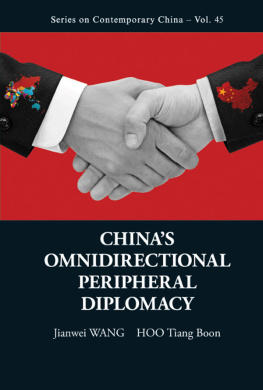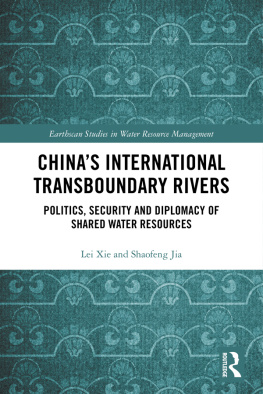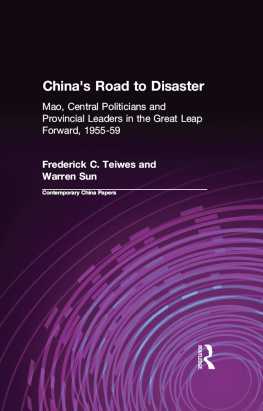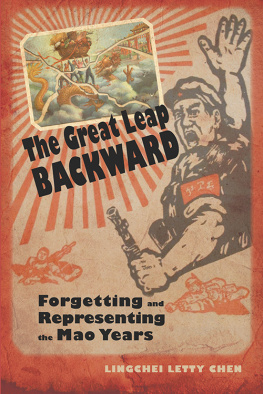Chinas Cultural Diplomacy
This book examines Chinas contemporary global cultural footprints through its recent development of cultural diplomacy.
The volume presents an alternative analytical framework to examine Chinas cultural diplomacy, which goes beyond the Western-defined concept of soft power that prevails in the current literature. This new approach constructs a three-dimensional framework on Orientalism, cultural hegemony and nationalism to decipher the multiple contexts, which China inhabits historically, internationally and domestically. The book presents multiple case studies of the Confucius Institute, and compares the global programme located around the world with its Western counterparts, and also with other Chinese government-sponsored endeavours and non-government-initiated programmes. The author aims to solve the puzzle of why Chinas efforts in cultural diplomacy are perceived differently around the world and helps to outline the distinctive features of Chinas cultural diplomacy.
This book will be of much interest to students of diplomacy, Chinese politics, foreign policy and International Relations in general.
Xin Liu is a Senior Lecturer and Chinese Course Leader at the University of Central Lancashire, UK.
Routledge New Diplomacy Studies
Series Editors: Corneliu Bjola
University of Oxford
and
Markus Kornprobst
Diplomatic Academy of Vienna
This series publishes theoretically challenging and empirically authoritative studies of the traditions, functions, paradigms and institutions of modern diplomacy. Taking a comparative approach, the New Diplomacy Studies series aims to advance research on international diplomacy, publishing innovative accounts of how old and new diplomats help steer international conduct between anarchy and hegemony, handle demands for international stability vs international justice, facilitate transitions between international orders, and address global governance challenges. Dedicated to the exchange of different scholarly perspectives, the series aims to be a forum for inter-paradigm and inter-disciplinary debates, and an opportunity for dialogue between scholars and practitioners.
Secret Diplomacy
Concepts, contexts and cases
Edited by Corneliu Bjola and Stuart Murray
Diplomatic Cultures and International Politics
Translations, spaces and alternatives
Edited by Jason Dittmer and Fiona McConnell
Sports Diplomacy
Origins, Theory and Practice
Stuart Murray
Countering Online Propaganda and Extremism
The Dark Side of Digital Diplomacy
Edited by Corneliu Bjola and James Pamment
Chinas Cultural Diplomacy
A Great Leap Outward?
Xin Liu
For more information about this series, please visit: www.routledge.com/Routledge-New-Diplomacy-Studies/book-series/RNDS
Chinas Cultural Diplomacy
A Great Leap Outward?
Xin Liu
First published 2020
by Routledge
2 Park Square, Milton Park, Abingdon, Oxon OX14 4RN
and by Routledge
52 Vanderbilt Avenue, New York, NY 10017
Routledge is an imprint of the Taylor & Francis Group, an informa business
2020 Xin Liu
The right of Xin Liu to be identified as author of this work has been asserted by her in accordance with sections 77 and 78 of the Copyright, Designs and Patents Act 1988.
All rights reserved. No part of this book may be reprinted or reproduced or utilised in any form or by any electronic, mechanical, or other means, now known or hereafter invented, including photocopying and recording, or in any information storage or retrieval system, without permission in writing from the publishers.
Trademark notice: Product or corporate names may be trademarks or registered trademarks, and are used only for identification and explanation without intent to infringe.
British Library Cataloguing-in-Publication Data
A catalogue record for this book is available from the British Library
Library of Congress Cataloging-in-Publication Data
A catalog record has been requested for this book
ISBN: 978-0-367-28153-3 (hbk)
ISBN: 978-0-429-32029-3 (ebk)
Typeset in Times New Roman
by Wearset Ltd, Boldon, Tyne and Wear
This book is dedicated to my family.
Contents
This is my first book thus I am indebted to so many people for its coming to fruition. Its seed started from my PhD and four journal articles which were published in 20172019 based on the PhD thesis. My deepest gratitude and appreciation goes to my PhD supervisors, Dr Petra Bagley and Dr Edward Griffith, my internal examiner, Dr Yu Tao, two external examiners, Dr Michael Barr and Dr Edney Kingsley, and all the anonymous reviewers for the journal articles published on Journal of Contemporary China, Asia Studies Review, Cambridge Journal of China Studies and Journal of Contemporary Eastern Asia. Without their support, guidance, insightful feedback and intellectual challenges, this seed could never have sprouted and blossomed.
Meanwhile, I could not be more grateful to my family for their generous and unselfish support throughout my career transition from China to the UK; then from a teacher and translator to a scholar, especially to my husband for having endless stimulating and candid discussions with me that helped develop the ideas, for keeping sending me recommended readings, and for encouraging me to reach high with a free mind to think beyond boundaries. I also want to give a special mention to my daughter, who is the first reader of the completed manuscript and who used her English and computer skills to help me polish the fruit by meticulously proofreading, pointing out the need for clarifications, checking even the smallest details and creating the word clouds. We enjoyed many rounds of delightful discussions over the key words chosen by the respondents in .
Next, I must thank all the interviewees for allowing me to collect primary data and for sharing their insights with me. I am especially indebted to Feixia Yu, Xin Gao, Jinghan Zeng and Meng Zhang, who helped me establish crucial contacts with different organisations that gave this book the breadth of its empirical evidence.
Equally grateful am I to the University of Central Lancashire for its continued support for staff development and for granting me sabbatical leave to concentrate on writing this book. My heartfelt thanks go to Feixia Yu again, who extends all-rounded help to me, from constantly sending me links to the latest news stories to helping me ring fence my time and for covering some of the teaching workload during my sabbatical.
I also want to thank Professor Simon Anholt and Dr Wolfram Manzenreiter for giving me permissions to reproduce the National Brands Hexagon and the 2008 China Brand Hexagon respectively, and Mr Jason Bair, Acting Director of International Affairs and Trade at the United States Government Accountability Office, for advising me on the copyright issue and directing me to the other GAO report on the Confucius Institute. I thank Kate at the Copyright unit of Uclan in helping me get a quote to pay for the Country Rating Table produced by Gallup.
I am also extremely grateful to the two anonymous reviewers of my book proposal and sample chapters, the series editors and Andrew Humphrys at Routledge for their inspiring and instrumental feedback and the confidence their positive comments have given me. Last but not least, my sincere gratitude to Bethany Lund Yates, my editorial assistant, for her patience, efficiency and professionalism in guiding me through the production process.


